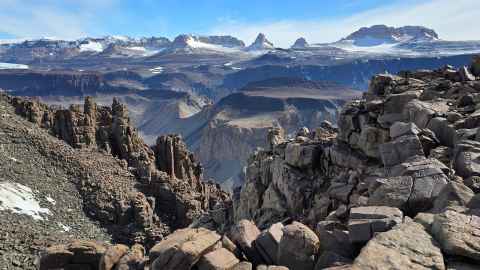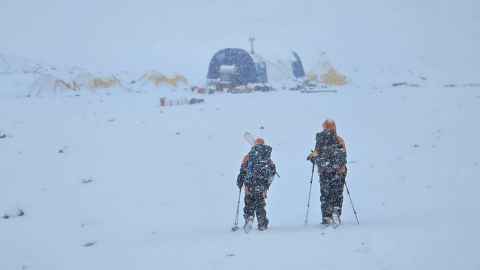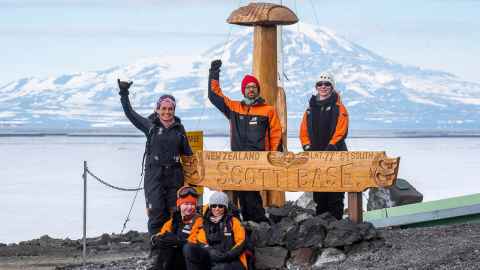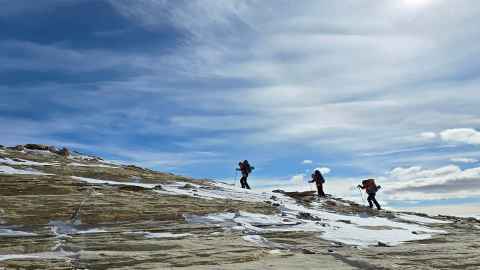Antarctic expedition unearths clues to climate catastrophe
14 May 2025
Rocks from the coldest continent hold clues to an extinction event 183 million years ago.

Antarctic rocks brought back from the continent by University of Auckland scientists hold clues to an extinction event 183 million years ago.
In the Early Jurassic period when the Gondwana supercontinent was breaking apart, hot magma rising through the Earth’s crust triggered the release of vast amounts of climate-warming carbon into the atmosphere with catastrophic results for many life-forms.
A team led by Professor James Muirhead of the School of Environment is probing exactly how the event unfolded.
During a 42-day expedition ending in February, they braved windchill temperatures of as low as -37 degrees Celsius, helicoptered to remote areas in the largely snow- and ice-free McMurdo Dry Valleys, and chiselled or sledgehammered at igneous and sedimentary rocks for samples.

Now, a dozen fish bins’ worth of Antarctic rock will be prepared by PhD student Katie Gilchrist for analysis at the University and at a University of Otago paleomagnetic research facility.
The scientists are focused on the Ferrar Large Igneous Province, the name for an area of volcanic intrusionsstretching across Antarctica which resulted from hot magma flowing through the upper levels of the Earth’s crust toward the surface.
The aim is to reconstruct how the magma burned off the organic carbon locked up in sedimentary rocks to release greenhouse gas. Analysing the rocks may reveal the rate of heating and the rate of carbon release – and hence give a sense of whether the event was sufficiently powerful in itself to cause the dramatic climate effects.

The Early Jurassic event somewhat parallels what’s happening on Earth today, including the environmental stresses on living things – except one was a natural release of organic carbon, while the other is human-caused.
“Scientifically, the field season was a great success,” says Muirhead. “We managed to achieve all of our objectives for each of the sites, despite some difficulties with weather and accessing some of the outcrops.”
“It was quite a workout,” says Gilchrist. “We hiked for many kilometres across five sites carrying large packs with our survival gear and on multiple occasions returned to camp with more than 20 kilograms of samples in our packs.”

New Zealand’s Scott Base team helped with logistics for the visiting group of Muirhead, Gilchrist, Masters student Zoe Armstrong, guide Bia Boucinhas, and Australian researcher Dr Sandra Rodrigues.
Mostly, temperatures with wind chill were -20 to -25 degrees Calcius and the weather was good. Coldest was Mount Fleming at a wind chill temperature of -37 degrees Calcius during a blizzard with wind speeds of 100 km/h that confined the group to camp.
Media contact
Paul Panckhurst | science media adviser
M: 022 032 8475
E: paul.panckhurst@auckland.ac.nz